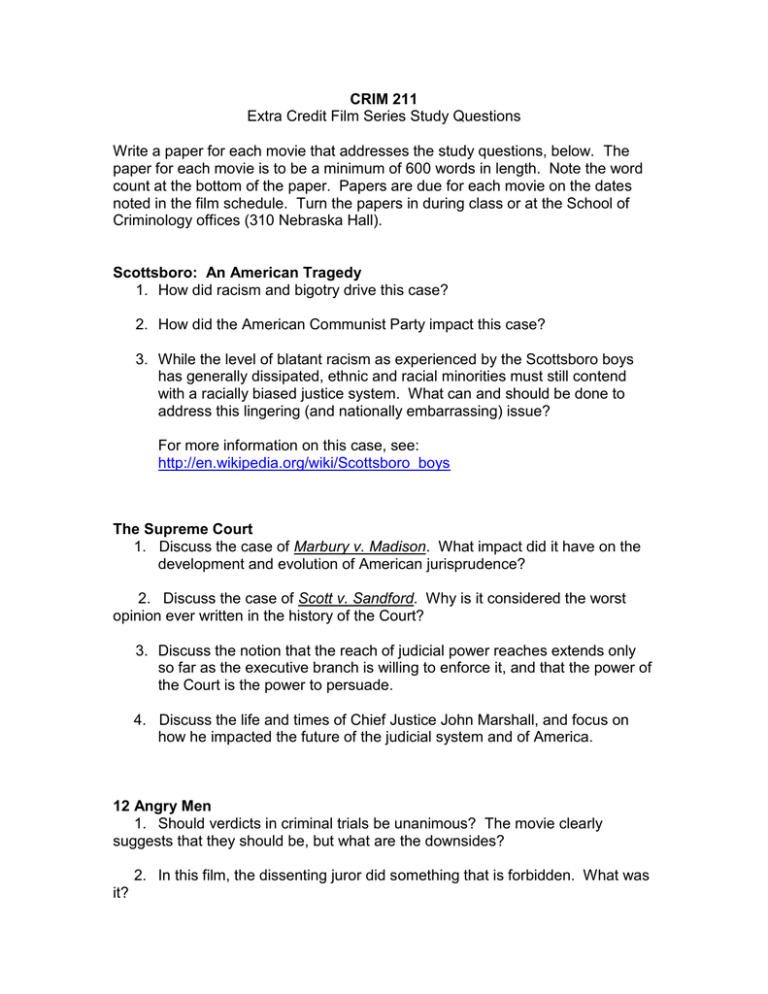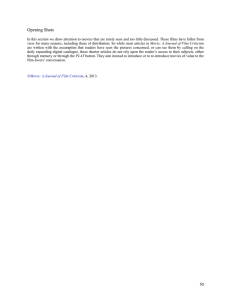Extra Credit Film Series - Study Questions
advertisement

CRIM 211 Extra Credit Film Series Study Questions Write a paper for each movie that addresses the study questions, below. The paper for each movie is to be a minimum of 600 words in length. Note the word count at the bottom of the paper. Papers are due for each movie on the dates noted in the film schedule. Turn the papers in during class or at the School of Criminology offices (310 Nebraska Hall). Scottsboro: An American Tragedy 1. How did racism and bigotry drive this case? 2. How did the American Communist Party impact this case? 3. While the level of blatant racism as experienced by the Scottsboro boys has generally dissipated, ethnic and racial minorities must still contend with a racially biased justice system. What can and should be done to address this lingering (and nationally embarrassing) issue? For more information on this case, see: http://en.wikipedia.org/wiki/Scottsboro_boys The Supreme Court 1. Discuss the case of Marbury v. Madison. What impact did it have on the development and evolution of American jurisprudence? 2. Discuss the case of Scott v. Sandford. Why is it considered the worst opinion ever written in the history of the Court? 3. Discuss the notion that the reach of judicial power reaches extends only so far as the executive branch is willing to enforce it, and that the power of the Court is the power to persuade. 4. Discuss the life and times of Chief Justice John Marshall, and focus on how he impacted the future of the judicial system and of America. 12 Angry Men 1. Should verdicts in criminal trials be unanimous? The movie clearly suggests that they should be, but what are the downsides? 2. In this film, the dissenting juror did something that is forbidden. What was it? 3. In addition to the facts of the case, what other forces and factors drove various jurors to vote as they did? 4. Should we retain the jury system in the United States? Why or why not? Real Justice 1. After viewing this film, a Boston news reporter, paraphrasing Otto von Bismark, suggested that no one should have to witness the making of sausages and justice. Are there any aspects of the justice process as portrayed in this documentary, that you find particularly unsettling? 2. The “truth” appears not merely to be difficult to ascertain, but virtually impossible to determine in a criminal courtroom. Why is that the case? 3. After a not guilty verdict, the defense attorney in the case loudly proclaims, “they system works, the system works.” Do you agree with him? Why or why not? The Plea 1. What motivates prosecutors, defense attorneys, and defendants to pleabargain? 2. What are the risks and advantages to a system that utilizes plea bargaining as extensively as does ours? 3. What responsibilities do defense attorneys have to their clients?



